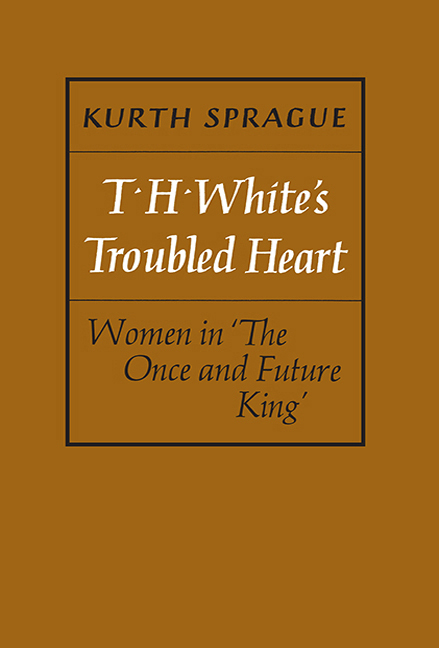Book contents
- Frontmatter
- Dedication
- Contents
- Miscellaneous Frontmatter
- Acknowledgements
- Foreword T. H. White Holdings at the Harry Ransom Center
- Preface
- Introduction
- Chapter One T.H. White
- Chapter Two Constance White
- Chapter Three White's Sources
- Chapter Four Omitted and Minor Characters
- Chapter Five Morgause
- Chapter Six Guenever
- Conclusion
- Appendixes
- Notes
- Survey of Criticism on White
- Bibliography
- Frontmatter
- Dedication
- Contents
- Miscellaneous Frontmatter
- Acknowledgements
- Foreword T. H. White Holdings at the Harry Ransom Center
- Preface
- Introduction
- Chapter One T.H. White
- Chapter Two Constance White
- Chapter Three White's Sources
- Chapter Four Omitted and Minor Characters
- Chapter Five Morgause
- Chapter Six Guenever
- Conclusion
- Appendixes
- Notes
- Survey of Criticism on White
- Bibliography
Summary
But oh my God if I could once get from my heart
What is in it about men and madness
Ambition and the blood of boys—
—T.H. White, ‘These are the Easy Verses.’
The S.S. Exeter put out from New York in the last days of 1963, bound for Spain, Italy, Egypt, Lebanon, and Greece. It was a typical North Atlantic winter passage, with a heavy choppy beam sea making hard going. White, a passenger on the cargo vessel, kept a careful eye on his luggage stacked in the corners of his cabin. Rough as the voyage was, White managed to write to his friend Harry Griffiths. This was typical of White. He told Griffiths that he might see Vito when the Exeter put in at Naples; he didn't know what the boy's vacation schedule was. In any case, he would go on to Greece, where he would take pictures of the Hadrian buildings.
Vito came aboard the Exeter at Naples. He was the son of a private taxi-cab driver whom White had befriended on an earlier trip to Naples, and had visited White on Alderney during the summer of 1963. On the morning of 17 January 1964, after finding White's cabin door locked, Vito Moriconi borrowed a key from the purser, opened the cabin, and discovered White dead from a probable heart attack.
White is buried in the Protestant cemetery in Athens. From the gravesite, one can see the Temple of Zeus and Hadrian's Arch. The view of Hadrian's Arch recommended itself to Harry Griffiths, who flew out to Athens to take charge of the funeral arrangements. White was fascinated by Hadrian.
White's simple gravestone is large, flat, and set flush with the earth. Cut in its plain surface is the outline of a reversed broadsword and the epitaph:
T.H. WHITE
1906 –– 1964
AUTHOR
WHO
FROM A TROUBLED HEART
DELIGHTED OTHERS
LOVING AND PRAISING
THIS LIFE
These words were written by Sylvia Townsend Warner, an author whom White admired greatly but had never met, who would be asked to write White's biography. White considered Warner's novel Mr. Fortune's Maggot one of the best books written in the twentieth century and had included extended mention of it in one of his lectures, ‘Luck in Literature.’
- Type
- Chapter
- Information
- T. H. White's Troubled HeartWomen in <I>The Once and Future King</I>, pp. 7 - 32Publisher: Boydell & BrewerPrint publication year: 2007

